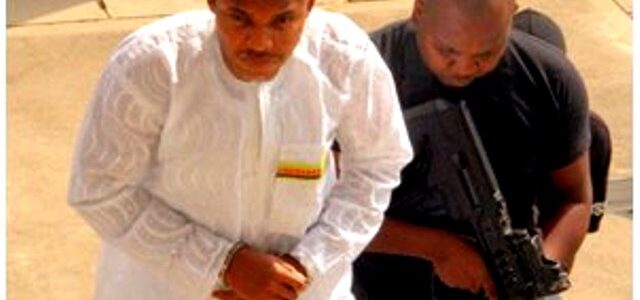
Barrister Aloy Ejimakor, front row lawyer in detained IPOB leader Nnamdi Kanu’s legal team, has faulted the Ohanaeze Ndigbo Worldwide led by Ambassador George Obiozor’s backing of Kanu with a monitoring legal team.
This is coming on the heels of the reaction of the factional Ohanaeze Ndigbo led by Okechukwu Isiguzoro dissociating itself from any move to monitor Kanu’s trial.

Ejimakor disclosed that “Lately, some individuals and civic groups have, in some show of support for Mazi Nnamdi Kanu, indicated that they will ‘monitor’ his trial. In the same vein, some have also called for a fair trial. Fair trial of what? Illegality in high places?”
He, however, averred that “While it’s commendable that Kanu has attracted such avalanche of support across the spectrum, it’s important to make it clear from the outset that there won’t be any trial to monitor. None. Nnamdi Kanu cannot be tried on the basis of this extraordinary rendition that brought him in Nigeria.”

He posited that if one truly supports Kanu, “you don’t need to monitor his trial or ensure he gets a fair trial. What you need to do is to oppose his trial. Saying that you will monitor his trial gives the impression of bestowing legality to the illegality that brought him to Nigeria.”
He explained that to better understand how Kanu ended up in Nigeria and why he won’t face trial, “you need to juxtapose it to what happened to Umaru Dikko in 1984 and its aftermaths. Dikko’s kidnapping was, like this one of Kanu, a brazen act of attempted rendition, which is a state crime under international law and it comes with dire consequences – legal, diplomatic and political.”
He added that though the kidnapping of Dikko failed, “it brought the following consequences: Britain swiftly arrested seventeen people, four were convicted and they served between six to eight years in prison. Britain expelled the Nigerian High Commissioner and broke diplomatic relations with Nigeria for 2 years. And most tellingly, Nigeria’s subsequent requests to Britain to extradite Dikko and others were summarily denied.
“Conversely, Kanu is a bonafide citizen of Britain, travelling on a British passport when he was unlawfully renditioned to Nigeria from Kenya. That should counter for more countervailing measures.
“What this means is that,” Ejimakor further explained, “apart from answering to its conscience as a nation, Nigeria shall ultimately answer to Britain, to the international community and even to Kenya if Kenya succeeds in denying official complicity in the rendition.”
He contended that a nation does not go to jail but explained that “so, when I stated that Nigeria will answer for the rendition, it means a mix of consequences, some of which are already unfolding. The easiest one to see is that Nigeria has, by her own hands, lost its jurisdiction to subject Kanu to trial. In sporting terms, you can say that Nigeria scored its own goal.
“How that own goal was scored and its fallouts is a complex legal subject that will certainly be ventilated in court and within the diplomatic circles to which Nigeria is subject. But one thing that is clear is this: No valid prosecutorial or judicial action can proceed from such manifestly criminal conduct by a state,” Ejimakor declared.
He reminded those talking of monitoring that “when you say you will be monitoring Kanu’s trial or that you want a fair trial for him, you are unwittingly buying into a grievous crime that should shock your conscience. Put another way, you will be making yourself complicit in what was done to Kanu or as lawyers would say: you’re making yourself an accessory after the fact.
“Conversely, it would be a great thing to say that you will monitor the trial if Kanu’s presence in Nigeria was compliant with due process. That due is nothing but what is generally known as extradition.
The defence counsel insisted that “Extradition is the only valid means of surrendering an international fugitive from one country to the other. That’s why Nigeria was punished for daring to kidnap Dikko. There’s no reason to think that Kanu’s case will be different.
“Nigeria,” he disclosed, “has an extradition statute which is known as the Extradition Act. Kenya has a similar law but with a slightly different name. Britain has its own. All three are, in substance, very similar and strict to boot.”
He stated that “What I can tell you, for now, assuming you don’t know it already is that Kanu’s rendition will live in infamy because it violated the extradition law of Kenya (the country of abduction), Britain (the country of domicile and citizenship) and even Nigeria (the country of destination).”
“If you add other municipal and international laws, conventions and protocols to which Nigeria is subject but chose to break just to bring Kanu to Nigeria, you begin to see why you must oppose his trial instead of monitoring it,” he concluded firmly.
Credit: Nigeria Tribune
